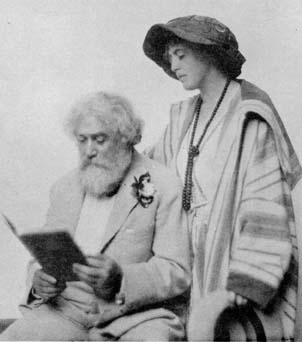Sara Bard Field (1882-1974)
John Cowper met Sara and Erskine Wood when he went to California in 1921 and he became Colonel Wood's 'protégé'. It was at their house in San Francisco which was a literary 'salon' that he met the poet Vachel Lindsay. In March 1921 he confides to Frances Gregg:
Sara ... says that if I can raise enough money to get Lulu to San Francisco she will be entirely responsible for him as soon as he is there and will get him back (quite cured she says) in the Fall. Isn't she an amazing woman?.. She has had a frigthful time... an operation and a sort of comatose sleep for nine days till everyone gave her up... but here she is alive still... but with a look of purged impersonality on her face that even your raking criticism would be struck by, I think.Somebody who knew her well, Dorothy Erskine, describes her thus:
(The Letters of John Cowper Powys to Frances Gregg)
What Sara cared for most was poetry. However, her greatest contribution may not have been as a poet, but as a mature, courageous, passionate individual. Her extraordinary combination of qualities could exist. She proved it by her presence and the love she gave and received from those who knew her. Her greatest gift, perhaps, was her personality, generous, compassionate, enthusiastic, affectionate. She set us free because she herself was free and untrammeled. She could write "true" but most of all she could live and sustain the reach of her mind and heart. She could be whole. An example of her poetry is Song from The Pale Woman.
Song
What you have seen to love in me
I do not know.
What I have seen to love in thee
No word can show.
But word or knowledge, dear, we lay aside.
We need them not for compass or for guide.
By love we go.
Sara Bard Field, from The Pale Woman
 |
|
(Regional Oral History, UC Berkeley) |
And this is what Sara Bard Field, towards the end of her life, reveals in an interview:
FIELD: The way we met John, while we were living in the Broadway house, was by means of a letter which was sent to us I think by Harriet Monroe, who was the editor of Poetry magazine to which I had been contributing some poems and some reviews of other poets' books as they came out. She wrote us and said that "the most extraordinary lecturer I've ever listened to is coming to San Francisco. He's an Englishman named John Cowper Powys, and I do hope that you will hear him and do what you can for so shy and retiring a man as he is."
The first lecture we attended was at the St. Francis Hotel, in the Gold Ballroom I remember. This extraordinary figure came onto the platform, dressed in a Cambridge gown (from which university he'd graduated), stooped, and with an unforgettable face, hawklike, with a searching gaze. When he began to speak it was probably as near as I will ever get to hearing an Old Testament prophet. He simply lost himself in the character, he became the character, almost, of which he was talking, and he brought out the nature of the person as well as the worth of their work and a criticism of the work in general. His audiences were nothing short of spellbound.
FRY: And he never planned a lecture beforehand?
FIELD: He never planned a lecture. He was of course highly educated and deeply versed in English literature, so it wasn't the careless talking of a man who's just had a little taste of things. But he never had any notes and as far as I could see (for you will se that finally he halfway lived with us and I would watch him before a lecture), he never made any preparations. He sometimes sat in deep thought before he would go to lecture, but other than that (and that was probably a rich and deep preparation), just that, there was no outward sign of preparation.
(Interview August 1962 with Sara Bard Field in Regional Oral History, Bancroft Library, UC Berkeley)
|
|